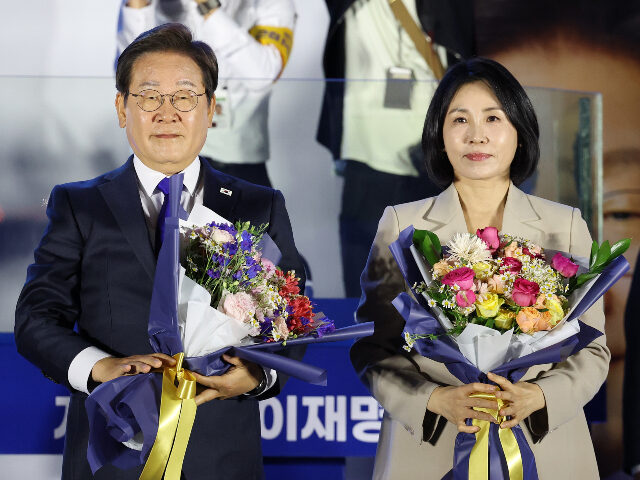Leftist Lee Jae-myung Wins South Korean Presidency

Leftist leader of the Democratic Party Lee Jae-myung won the South Korean presidential election on Tuesday with a comfortable lead over conservative rival Kim Moon-soo of the People Power Party (PPP), bringing an official end to a frantic chapter in the nation’s executive politics.
At press time, with 99.55 percent of the votes counted, Lee has received 49.36 percent support, compared to 41.23 percent for Kim – an insurmountable lead that Kim and Lee both acknowledged before dawn arose over the Korean peninsula on Wednesday.
Tuesday’s special election was necessitated by the impeachment and ouster of former President Yoon Suk-yeol, the conservative PPP candidate who narrowly defeated Lee in the 2022 election. On December 3, Yoon announced that he intended to indefinitely impose martial law on the country, shocking the general public and outraging lawmakers, who stormed the National Assembly and managed to vote down the martial law decree before the military could block their entry into the legislative chambers. Lee was among those lawmakers, filming himself on a livestream scaling the fence surrounding the National Assembly and defying soldiers blocking the path to participate in the vote.
The state of martial law lasted about six hours before Yoon apologized and reiterated his claims that threats from communist, pro-North Korean elements within the Democratic Party made the decree necessary.
What followed was a chaotic six months in which the presidency of South Korea fell into four different pairs of hands. Lee’s are expected to become the fifth in a hasty, low-key inauguration on Wednesday.
Much remains to be resolved following the martial law fiasco, including Yoon facing charges of insurrection in a trial expected to last the rest of the year. Lee also, however, has fought a prolonged legal battle since shortly after his 2022 defeat, facing accusations of false statements regarding a corruption case stemming from his prior position as governor of Gyeonggi province.
Lee dramatically protested some of the corruption allegations against him in 2023, going on a partial hunger strike – allowing for salt and water – and landing in the hospital three weeks later. Lee claimed his hunger strike was necessary to fight Yoon’s “tyranny” and “incompetence.”
Lee was initially found guilty in a case in which he was accused of making those statements during the past presidential election, implicating election law. That verdict should have resulted in Lee being banned from running for public office for five years, but was overturned in appellate court. In May, however, the nation’s Supreme Court overturned the appellate court, meaning Lee is still in danger of being banned from public office – now, potentially ousted from the presidency.
Lee’s legal and political woes were almost entirely eclipsed by the martial law scandal and the PPP’s prominent role in it, however. Lee reportedly did not address it in his victory speech, instead listing his priorities as “overcoming the aftermath of the insurrection; second, reviving the economy and people’s livelihoods; third, safeguarding people’s lives and safety; fourth, ensuring a peaceful and stable Korean Peninsula.”
The Korea JoongAng Daily also reported that Lee promised to “engage in talks with North Korea,” a dramatic departure from Yoon’s policy of recognizing the continued existence of the Korean War – paused but not ended by an armistice agreement in 1953 – and seeking to forge stronger ties with the United States.
Kim, who campaigned warning that the left-wing Democrats would damage the South Korean economy but struggled to overcome concerns over the martial law decree, issued a concession speech after 1:30 a.m. local time, stating that he would “humbly accept the people’s choice” and congratulating Lee.
“Korea has continued to make great progress with the power of the people, no matter what crisis it has faced,” Kim emphasized.
While the PPP and Democrats campaigned aggressively against each other’s policies, this election lacked the sheer vitriol that existed between Lee and Yoon in the 2022 race, leading to a more conciliatory election night. It also lacked the violence of that race; the Democrats faced a violent hammer attack at the hands of a 70-year-old “Youtuber” in March 2022 that alarmed many political observers.
Lee himself was the target of violence again in January 2024 when an assailant attempted to stab him in the neck, narrowly missing a critical artery. The attack was not enough to stop multiple Democratic lawmakers from defecting, condemning Lee for running a “regime” that did not allow for a diversity of voices within his party.
“We must judge and hold the Yoon Suk Yeol administration accountable for its self-righteousness, incompetence and irresponsibility,” defecting lawmaker Kim Jong-min declared at the time. “However, we can’t pass judgment on the Yoon administration under the current Lee Jae-myung regime.”
The defections ultimately did little to weaken Lee’s stranglehold on power in the party, which was especially fortified by his vocal opposition to the martial law decree.
No such chaotic incidents have been reported during Election Day at press time, though the news agency Yonhap reported a bizarre incident of someone flying a pro-Kim red balloon near a polling station, violating election law.